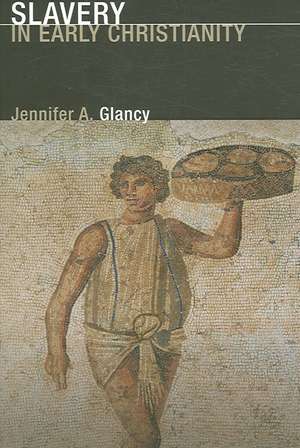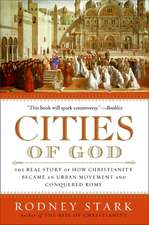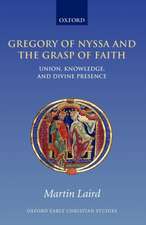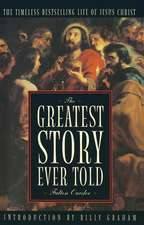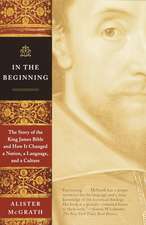Slavery in Early Christianity
Autor Jennifer A. Glancyen Limba Engleză Paperback – 14 sep 2006
| Toate formatele și edițiile | Preț | Express |
|---|---|---|
| Paperback (1) | 107.80 lei 6-8 săpt. | |
| Fortress Press – 14 sep 2006 | 107.80 lei 6-8 săpt. | |
| Hardback (1) | 803.19 lei 32-37 zile | |
| Oxford University Press – 28 mar 2002 | 803.19 lei 32-37 zile |
Preț: 107.80 lei
Nou
Puncte Express: 162
Preț estimativ în valută:
20.63€ • 22.06$ • 17.20£
20.63€ • 22.06$ • 17.20£
Carte tipărită la comandă
Livrare economică 17 aprilie-01 mai
Preluare comenzi: 021 569.72.76
Specificații
ISBN-13: 9780800637897
ISBN-10: 0800637895
Pagini: 203
Ilustrații: black & white illustrations
Dimensiuni: 155 x 230 x 13 mm
Greutate: 0.36 kg
Ediția:1
Editura: Fortress Press
ISBN-10: 0800637895
Pagini: 203
Ilustrații: black & white illustrations
Dimensiuni: 155 x 230 x 13 mm
Greutate: 0.36 kg
Ediția:1
Editura: Fortress Press
Notă biografică
Jennifer A Glancy is Joseph C George Professor of Religious Studies at Le Moyne College, New York, USA. The Chair of the Bible and Cultural Studies section of the Society of Biblical Literature, she has written numerous articles on issues of gender and culture in early Jewish and Christian writings, and coauthored Introduction to the Study of Religion (Orbis, 1998).
Descriere
Descriere de la o altă ediție sau format:
Slavery was widespread throughout the Mediterranean lands where Christianity was born and developed. Though Christians were both slaves and slaveholders, there has been surprisingly little study of what early Christians thought about the realities of slavery. How did they reconcile slavery with the Gospel teachings of brotherhood and charity? Slaves were considered the sexual property of their owners: what was the status within the Church of enslaved women and young male slaves who were their owners' sexual playthings? Is there any reason to believe that Christians shied away from the use of corporal punishments so common among ancient slave owners? Jennifer A. Glancy brings a multilayered approach to these and many other issues, offering a comprehensive re-examination of the evidence pertaining to slavery in early Christianity. Drawing on a wide variety of sources, Glancy situates early Christian slavery in its broader cultural setting. She argues that scholars have consistently underestimated the pervasive impact of slavery on the institutional structures, ideologies, and practices of the early churches and of individual Christians. The churches, she shows, grew to maturity with the assumption that slaveholding was the norm, and welcomed both slaves and slaveholders as members. Glancy draws attention to the importance of the body in the thought and practice of ancient slavery. To be a slave was to be a body subject to coercion and violation, with no rights to corporeal integrity or privacy. Even early Christians who held that true slavery was spiritual in nature relied, ultimately, on bodily metaphors to express this. Slavery, Glancy demonstrates, was an essential feature of both the physical and metaphysical worlds of early Christianity. The first book devoted to the early Christian ideology and practice of slavery, this work sheds new light on the world of the ancient Mediterranean and on the development of the early Church.
Slavery was widespread throughout the Mediterranean lands where Christianity was born and developed. Though Christians were both slaves and slaveholders, there has been surprisingly little study of what early Christians thought about the realities of slavery. How did they reconcile slavery with the Gospel teachings of brotherhood and charity? Slaves were considered the sexual property of their owners: what was the status within the Church of enslaved women and young male slaves who were their owners' sexual playthings? Is there any reason to believe that Christians shied away from the use of corporal punishments so common among ancient slave owners? Jennifer A. Glancy brings a multilayered approach to these and many other issues, offering a comprehensive re-examination of the evidence pertaining to slavery in early Christianity. Drawing on a wide variety of sources, Glancy situates early Christian slavery in its broader cultural setting. She argues that scholars have consistently underestimated the pervasive impact of slavery on the institutional structures, ideologies, and practices of the early churches and of individual Christians. The churches, she shows, grew to maturity with the assumption that slaveholding was the norm, and welcomed both slaves and slaveholders as members. Glancy draws attention to the importance of the body in the thought and practice of ancient slavery. To be a slave was to be a body subject to coercion and violation, with no rights to corporeal integrity or privacy. Even early Christians who held that true slavery was spiritual in nature relied, ultimately, on bodily metaphors to express this. Slavery, Glancy demonstrates, was an essential feature of both the physical and metaphysical worlds of early Christianity. The first book devoted to the early Christian ideology and practice of slavery, this work sheds new light on the world of the ancient Mediterranean and on the development of the early Church.
Recenzii
Glancy's book is clear, forceful, and important; it belongs on the shelves of scholars and in classrooms, both graduate and undergraduate.
... for providing a much more complex and morally troubling picture of the intersection of developing Christianity and the institution of slavery, this book is to be commended.
... the book is well-written and provides a good introduction to ancient slavery in general and Christian attitudes toward slaves in particular. It may also attract the non-specialist reader interested in ancient society and Christian origins.
Glancy's book ranges widely across a large number of ancient Christian and other writings, but she writes clearly and always quotes in English. Therefore her work is readily accessible to a wide range of Christian readers interested in how we make moral decisions in a society whose norms, values and expectations may be far removed from our own ... she raises a number of important questions that have been overlooked by others.
The contributions of G.'s Slavery in Early Christianity to our understanding of the embodied experience of enslavement, the abuses of enslavement, and the problematic, complicatedstatus of enslaved persons in early Christian communities cannot be ignored. The book remains an essential reference for all who are interested in the social worlds of the first century.
... for providing a much more complex and morally troubling picture of the intersection of developing Christianity and the institution of slavery, this book is to be commended.
... the book is well-written and provides a good introduction to ancient slavery in general and Christian attitudes toward slaves in particular. It may also attract the non-specialist reader interested in ancient society and Christian origins.
Glancy's book ranges widely across a large number of ancient Christian and other writings, but she writes clearly and always quotes in English. Therefore her work is readily accessible to a wide range of Christian readers interested in how we make moral decisions in a society whose norms, values and expectations may be far removed from our own ... she raises a number of important questions that have been overlooked by others.
The contributions of G.'s Slavery in Early Christianity to our understanding of the embodied experience of enslavement, the abuses of enslavement, and the problematic, complicatedstatus of enslaved persons in early Christian communities cannot be ignored. The book remains an essential reference for all who are interested in the social worlds of the first century.
